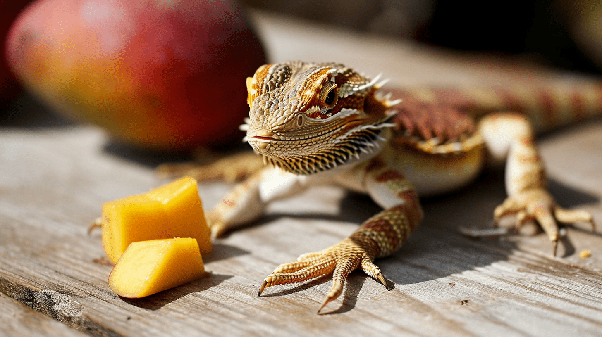
When it comes to the diet of a bearded dragon, it’s essential to provide them with a balanced and nutritious meal. While insects and leafy greens are typically the primary components of their diet, many reptile owners wonder if fruits like mango can be included. In this article, we will explore whether or not Can a Bearded Dragon Eat Mango and the potential benefits and risks associated with it.
Understanding Bearded Dragon’s Diet
Before we delve into the specifics of feeding mango to bearded dragons, it’s important to have a basic understanding of their dietary requirements. Bearded dragons are omnivorous reptiles, meaning they eat both plant-based foods and insects. Their diet primarily consists of leafy greens, vegetables, and a variety of insects such as crickets and mealworms. This combination provides them with the necessary nutrients for optimal health and growth.
Nutritional Value of Mango
Mango is a tropical fruit known for its sweet and juicy flavor. It is also rich in several essential nutrients, including vitamins A, C, and E, as well as dietary fiber and antioxidants. These nutrients play a crucial role in maintaining the overall health and well-being of humans. However, the nutritional needs of bearded dragons are quite different from ours.
Can a Bearded Dragon Eat Mango?
The answer is yes, bearded dragons can eat mango, but it should be offered in moderation. While mango does contain some beneficial nutrients, it is also high in sugar, which can be detrimental to their health if consumed excessively. Therefore, mango should be considered an occasional treat rather than a staple part of their diet.
Benefits of Feeding Mango to Bearded Dragons
Feeding small amounts of mango to your bearded dragon can provide some benefits. Mango contains vitamin A, which is essential for maintaining good vision and supporting the immune system. Additionally, the dietary fiber in mango can aid in digestion and promote regular bowel movements. However, it’s important to note that these benefits can be obtained from other fruits and vegetables as well.
Risks and Considerations
While mango can offer some nutritional benefits, there are certain risks and considerations to keep in mind. As mentioned earlier, mango is high in sugar, which can lead to obesity and other health issues if consumed excessively. Bearded dragons also have specific calcium-to-phosphorus ratio requirements, and mango has a higher phosphorus content, which can disrupt this balance if fed in large quantities. Therefore, moderation is key when offering mango to your bearded dragon.
How to Prepare Mango for Bearded Dragons
Before feeding mango to your bearded dragon, it’s crucial to prepare it properly. Start by selecting a ripe mango that is not overly soft or overripe. Peel off the skin and remove the pit, as it can be a choking hazard. Cut the mango into small, bite-sized pieces to make it easier for your pet to consume. It’s important to ensure that the mango is fresh and free from any pesticides or chemicals.
Other Fruits for Bearded Dragons
While mango can be offered as a treat for your bearded dragon, there are several other fruits that can also be included in their diet. These fruits provide a variety of nutrients and flavors to keep their diet interesting and balanced. Some safe options include:
- Berries: Blueberries, raspberries, and strawberries are all excellent choices. They are low in sugar and high in antioxidants, vitamins, and minerals.
- Papaya: Papaya is a tropical fruit that is rich in vitamin C and digestive enzymes. It can help promote healthy digestion in bearded dragons.
- Apples: Apples are a great source of fiber and vitamin C. Make sure to remove the seeds and core before offering them to your bearded dragon.
- Pears: Pears are gentle on the digestive system and contain a good amount of fiber. They can be a tasty and nutritious addition to your pet’s diet.
- Watermelon: Watermelon is hydrating and contains a high water content. It can be a refreshing treat for your bearded dragon, especially during hot weather.
Remember to always introduce new fruits gradually and in small quantities to ensure that your bearded dragon tolerates them well. It’s important to observe any signs of digestive upset or allergies and adjust their diet accordingly.
Conclusion
In conclusion, Can a Bearded Dragon Eat Mango, it should be given in moderation due to its high sugar content. Mango can provide some nutritional benefits, but they should not replace the primary components of their diet, such as leafy greens and insects. Always prioritize a well-balanced and varied diet to ensure the optimal health and well-being of your bearded dragon.
Can a Bearded Dragon Eat Mango
FAQs (Can a Bearded Dragon Eat Mango)
No, it is best to remove the skin before offering mango to your bearded dragon. The skin can be tough to digest and may pose a choking hazard.
Mango should be considered an occasional treat and not a daily staple. Once or twice a month is generally a safe frequency.
Dried mango is not recommended for bearded dragons. It is higher in sugar concentration and lacks the hydration benefits of fresh mango.
Signs of intolerance may include diarrhea, vomiting, lack of appetite, or changes in behavior. If you notice any of these signs, discontinue feeding mango to your pet.
No, mango leaves are not suitable for bearded dragons. Stick to offering the fruit itself in small, prepared pieces.
